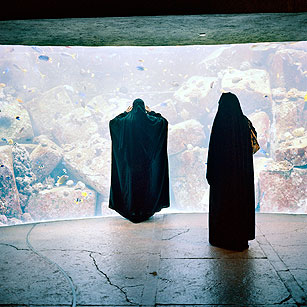
Transfixed Traditionally garbed Muslim women seem entranced by an exhibit at the Atlantis aquarium in Dubai
(2 of 2)
As Ross Dunn and other scholars have pointed out, some of Ibn Battuta's passages (and he's not alone in this) are taken verbatim from earlier Islamic travelers' accounts; his descriptions of the Pyramids, say, are so vague that (as with Marco Polo) it seems likely that he never saw them or some of the other places he describes. His chronology in many places makes no sense at all, and in dictating his book after his return to Morocco, apparently without notes, to a young Andalusian scholar he had met in Granada, he seems to have either misremembered many dates or, like a proto Bruce Chatwin, created composites and taken shortcuts in the interest of storytelling.
We turn to Polo for the practical information he collects and the unexpected accuracy of many of his details; we read Ibn Battuta — who set out a year after Polo died — for his digressions and the flavor of his often orientalizing personality. In India, for example, he goes out of his way to describe most of the people he meets as "infidels" and to tell of how a blind man is dragged by his feet for 10 days and condemned men are cut to pieces by elephants. In the Maldives he suggests that he has picked up so many wives along the way (six on that set of islands alone) and fathered so many children that a vizier is fearful of the fast-growing Ibn Battuta clan. It almost makes for apt poetic justice that the only English-language version of his travels I could find in a huge bookstore in the Middle East this spring was the 1829 translation edited by the British Rev. (and professor of Arabic at Cambridge) Samuel Lee, its footnotes bristling with references to Genesis and harrumphs about how Ibn Battuta is "superstitious, and addicted to the marvellous."
When we read his Rihla today, we are struck at how Genghis Khan, memories of whom were still fresh when Ibn Battuta was writing, is described as "a liberal-minded, powerful and corpulent person"; Yemen, so mired in chaotic poverty these days, is in parts "abounding with every commodity." China, for the traveling Muslim, was "the safest and most agreeable country in the world," though Ibn Battuta could not bear to go out often because of its godlessness. As in any "as told to" version, it's hard to know what exactly can be ascribed to the official author and what to his ghost. But the curiosity that constantly pushes Ibn Battuta forward flashes into life as, having dispensed with a visit to Mecca in a sentence, he lavishes a long paragraph on the cuisine of Mogadishu — roasted plantain fruit boiled in new milk and served with "bundles of preserved pepper-pods, salted and pickled" and grapes and green ginger.
Completing the Circle
Just as I was reading such Anthony Bourdain-worthy passages recently, I found myself, by chance, in the Ibn Battuta Mall in Dubai. Filipinas were modeling sarongs outside a L'Occitane outlet. A friendly Indian invited me to sample language tapes that could make me fluent in Dari and Albanian and Quechua, even "American." An Iranian restaurant sat next to Tony Roma's (with a Pizza Express across the courtyard). With six large zones devoted to areas that Ibn Battuta visited and a central display on Ibn Battuta himself (right next to a Starbucks and across from a Nine West), the mall did its earnest best to honor both the exoticism of his itinerary and his spirit of inquiry.
Yet the deepest memory of the pious Muslim came for me at exactly noon: a quiet call to prayer passed over all the glossy corridors, floating over the Body Shop and the Tipsy Gypsy store, over the Laughing Buddha stall and the 21-screen cinema showing Space Chimps in digital 3-D. For a moment, the blown-up photo of Elvis in one window and the Hello Kitty display in another were put into place by something more eternal. And the far-off cultures represented by every other customer and salesperson might almost have borne out the spirit and the purpose of the indomitable Moroccan's journey. He may not have planned it, I thought, but Ibn Battuta had done what many great travelers surely dream about: he had become a site, a destination in himself.
Iyer, a writer for TIME since 1982, is the author of many books about travel, among them Video Night in Kathmandu, The Lady and the Monk and The Global Soul